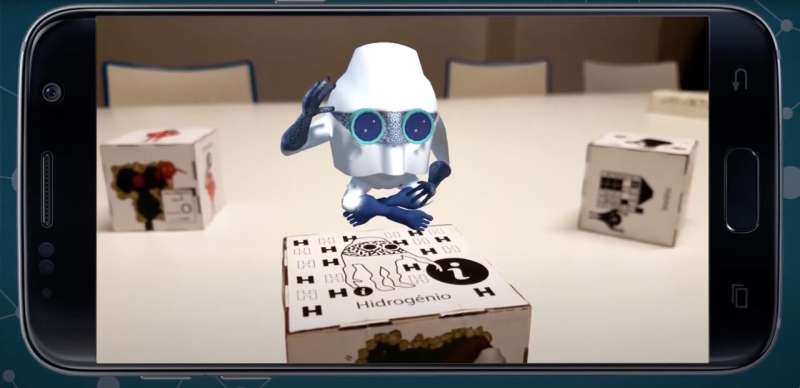An augmented reality game makes chemistry less intimidating for children, study finds

Researchers developed an educational game that uses augmented reality and tangible interaction to teach STEM to young students. They recently revealed their research findings on the usage and efficiency of the game to promote the learning of chemistry and improve children’s perception towards the subject.
The study aimed to address the problem of children’s perception of chemistry as a challenging and complex subject, which can lead to poorer academic performance and a reduced interest in pursuing careers in STEM subjects. The game Periodic Fable Discovery presents children with scientific content supported by an exploratory activity using manipulable physical cubes and augmented reality.
The game intends to entertain children while engaging them with compelling storytelling about the basics of chemistry and the periodic table. “Children use smartphones to acquire information about a specific chemical element by pointing the smartphone camera to the cubes’ surface. Each face reveals text, audio, or animations about specific chemical element properties,” explains Sandra Câmara Olim, leading researcher.
These results were presented in February at the ACM International Conference on Tangible, Embedded and Embodied Interaction in Warsaw. Sandra Câmara Olim, a researcher at the Interactive Technologies Institute, leads the project supervised by Valentina Nisi, Professor at Instituto Superior Técnico. The study’s quantitative and qualitative results showed significant positive results in the participants’ learning outcomes and engagement.
“Children retained more information about Chemistry and the periodic table, leading to better performance in knowledge tests. Additionally, students shifted their perception of chemistry from a difficult and tedious subject to an interesting and useful one,” says the researcher.
The study encourages researchers to continue evaluating this design system as a tool to promote STEM education. The research provides insights into the design and development of AR game-based experiences using an interdisciplinary approach between learning content, human factors, and technologies to promote children’s interest in chemistry.
“Combining our technological know-how with teachers’ pedagogical skills allowed us to develop a fun interactive game that uses storytelling to create an emotional connection with children, thus improving their interest in the topic,” says Sandra.
The game mechanics of Periodic Fable are designed to engage children in learning about chemistry through storytelling, physical interaction with manipulable cubes, and augmented reality. The game consists of an interactive, entertaining, and memorable learning experience for children, which can lead to better retention of knowledge and increased interest in the subject.
By using physical cubes, the game provides a tactile experience that allows children to manipulate and explore the elements of the periodic table in a hands-on way. Augmented reality further enhances the experience by adding a digital layer that overlays information and animations onto the physical cubes, making the learning experience more engaging and immersive. The researchers plan to continue evaluating the game’s design and effectiveness by conducting further studies with more participants and exploring the potential long-term impact of AR-based games on students’ perseverance in science education and their spatial skills development.
The Periodic Fable project is part of Sandra Câmara Olims doctoral research. The set of AR-based educational games is aimed at children aged nine to 13 years, with different pedagogical approaches to facilitate the assimilation of academic concepts in a fun and playful way.
The researchers believe this study will have a long-term impact on society by providing insights into the design and development of AR-based games to promote STEM education. The paper is published as part of the Proceedings of the Seventeenth International Conference on Tangible, Embedded, and Embodied Interaction.
More information:
Sandra Monica Camara Olim et al, “Periodic Fable Discovery” Using Tangible Interactions and Augmented Reality to Promote STEM Subjects, Proceedings of the Seventeenth International Conference on Tangible, Embedded, and Embodied Interaction (2023). DOI: 10.1145/3569009.3572804
Provided by
Interactive Technologies Institute
Citation:
An augmented reality game makes chemistry less intimidating for children, study finds (2023, March 6)
retrieved 6 March 2023
from https://phys.org/news/2023-03-augmented-reality-game-chemistry-intimidating.html
This document is subject to copyright. Apart from any fair dealing for the purpose of private study or research, no
part may be reproduced without the written permission. The content is provided for information purposes only.
For all the latest Science News Click Here
For the latest news and updates, follow us on Google News.

